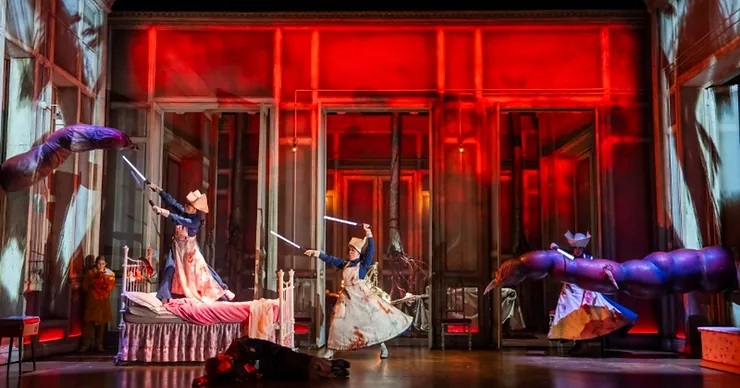
FOR the start of her first full year as general director, Laura Canning is presiding over an autumn of three revivals, of which this production by James Brining is the first.
Doubtless she had no say in the schedule, but it still looks cautious, especially when viewed in the wake of, for example, Buxton Festival’s five new productions this summer.
Brining operates as artistic director of Leeds Playhouse, just a short walk away from the Grand Theatre, and this had been his first full operatic production. It still shows signs of over-calculation.
Before the curtain we are treated to a welcome designed to embrace newcomers. Old-stagers might have regarded it as patronising but, seen alongside a bare-bones outline in the programme of what constitutes opera in the first place, it is arguably a useful introduction to an artform that too many have found intimidating: an attempt to cast the audience net more widely, in other words.
This process must be treated gingerly, however, if the company’s core audience is not to be deterred. The overture is intended as an introduction, presenting themes and building anticipation.
All of that is dissipated when it is overlaid with a dumb show, based on Bergman’s cinematic view of the whole work being a child’s dream/nightmare, that has little or nothing to do with Mozart. So, overture and dumb show are at odds with one another: in our screen-obsessed age, the eyes take over and the overture goes for naught.
As it was, Christoph Koncz, making his Leeds debut, opened the overture very slowly and followed with an extremely rapid allegro, which the orchestra – now under its new leader Katie Stillman – handled with panache. Thereafter Koncz impresses with the transparency of the textures he conjures.
Egor Zhuravskii has graduated from Fenton in Falstaff to Tamino here, and does so smoothly enough. Narrow at the start, his tone opens out over time but remains a little dry, albeit stylish. There is not much genuine feeling between him and Claire Lees’s admirable Pamina, but she entrances with every appearance and sounds ready for greater things.
Leaning heavily on his Welsh lilt, Emyr Wyn Jones makes an affable dunderhead of Papageno, almost taking the pantomime route, while Anna Dennis makes an imposing Queen of Night, edgy, determined and accurate.
Msimelelo Mbali, as Sarastro, lacks the gravitas shown by Andri Björn Robertsson’s Speaker, but his bass grows in authority in Act 2. Colin Judson offers an apt irritant as Monostatos, in place of the repellent figure we had last time.
Pasquale Orchard makes a charming Papagena, although she is introduced to Papageno early and deprived of her ‘old lady’ disguise. Many of the lesser roles are ably assumed by members of the chorus, proving its versatility.
Colin Richmond’s flexible set proves its worth once again, as does Douglas O’Connell’s high-impact video effects.
Brining envisaged Blakean poles of innocence and experience. He might instead have allowed Mozart and Schikaneder – in Jeremy Sams’s colloquial translation – to speak for themselves. The plot is complicated enough as it is.
Review by Martin Dreyer
Performances: Leeds Grand Theatre, February 12, 13, 15 and 22 2025, 7pm. Box office: 0113 243 0808 or leedsheritagetheatres.com. Hull New Theatre, March 27 and 29 2025, 7pm. Box office: hulltheatres.co.uk.
